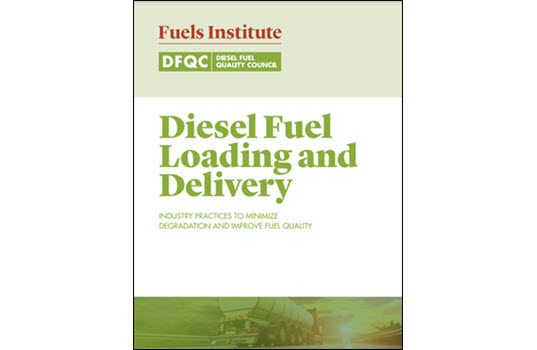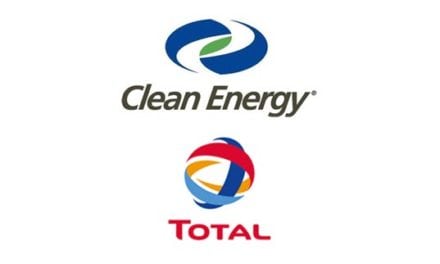Fuel distributors can help reduce diesel fuel contamination, promote storage tank health and improve fuel quality by taking specific steps when loading and unloading diesel fuel, according to a new report published by the Fuels Institute.
This new resource, published by the Fuels Institute’s Diesel Fuel Quality Council (DFQC), a nonadvocacy group of diverse stakeholders in the heavy-duty transportation energy industry, contains a series of suggested practices to assist diesel fuel distributors—those transporting fuel from a distribution terminal to a retail or commercial facility storage tank—in protecting fuel quality while loading and unloading fuel.
“Diesel Fuel Loading and Delivery: Industry Practices to Minimize Degradation and Improve Fuel Quality” is an easy to read, step-by-step manual that walks diesel fuel distributors through practical solutions to address fuel quality and avoid costly contamination problems.
“The Fuels Institute launched the Diesel Fuel Quality Council because stakeholders came to us asking for help to improve the overall quality of diesel fuel being dispensed in the country,” said John Eichberger, executive director of the Fuels Institute.
“In working with members of the Council, we identified fuel delivery to be one of the critical control points that could be improved by providing insight into the best industry practices to reduce comingling and potential contamination and thus help prevent negative impacts to equipment and engines. This report has gone through exhaustive review to ensure that is represents valuable guidance that will have a significant positive influence on tank owners and vehicle operators.”
For years, diesel fuel tank operators have been reporting increased rates of equipment corrosion and degradation, resulting in costly remediation or equipment replacement. Meanwhile, fuel quality has become more of a concern to engine manufacturers and truck operators as they have experienced increased rates of fuel-related issues with new high-pressure injection and aftertreatment systems developed to meet tightening fuel efficiency and emission standards.
Fuel quality is the responsibility of the entire industry, from the refiner to the tank owner, and each segment of the supply chain should follow best practices to mitigate fuel quality concerns. By adopting the best practices found in the DFQC’s guidance document, diesel fuel distributors can do their part to preserve fuel quality.
“No single part of the supply chain can resolve fuel quality issues by itself—this requires a collaborative effort throughout the system,” Eichberger explained. “Yet, each segment can do its part to ensure that the fuel is being handled in the most responsible way while in its possession. This resource is one more tool designed to help a critical segment of the supply chain support fuel quality.”
The guidance document was extensively reviewed and approved by the Diesel Fuel Quality Council, which is comprised of engine manufacturers, refiners, biofuels producers, fleets, distributors, equipment producers, tank servicing experts and retailers alike. This process ensures that the report presents the industry’s best practices that distributors can utilize to minimize degradation and contamination and therefore costly damage to fuel equipment and vehicles. It reviews the potential points where fuel quality issues can occur, how to spot fuel quality issues, and gives options of how to quickly manage impacted fuels.
“Diesel Fuel Loading and Delivery: Industry Practices to Minimize Degradation and Improve Fuel Quality” was curated from reviewing leading recommended practices for distributors delivering both to underground storage tanks and aboveground storage tanks, as well as interviews with leading industry experts who have found success maintaining diesel fuel quality with innovative practices.
By following the suggestions in the report, diesel fuel distributors may significantly minimize quality risks associated with transporting fuel and therefore, reduce costs associated with tank system repair, premature equipment replacement and potential customer loss due to poor fuel quality.
For a free copy of “Diesel Fuel Loading and Delivery: Industry Practices to Minimize Degradation and Improve Fuel Quality,” visit Fuel Quality Council | Fuels Institute.
This is the second best-practices report published by the Diesel Fuel Quality Council. The first report, “Diesel Storage Tanks: Industry Practices to Minimize Degradation and Improve Fuel Quality,” can also be downloaded at Fuel Quality Council | Fuels Institute
The Fuels Institute, founded by NACS in 2013, is a nonprofit research-oriented think tank that evaluates market issues related to vehicles and the fuels that power them, incorporating the perspective of diverse stakeholders to develop and publish peer-reviewed, comprehensive, fact-based research projects. The Fuels Institute is a nonbiased organization that does not advocate.
The Diesel Fuel Quality Council was convened to address industry complaints that diesel engines were experiencing problems presumably due to fuel quality. Made up of a diverse representation of the heavy-duty industry, the Diesel Fuel Quality initiates research to better understand the interplay between the needs of modern diesel engines and diesel fuel quality, both in terms of specifications and cleanliness. It is the goal of the Council to disseminate objective data and analyses to help the industry function better as new fuels and engine technologies are introduced to reduce emissions and increase efficiency.








